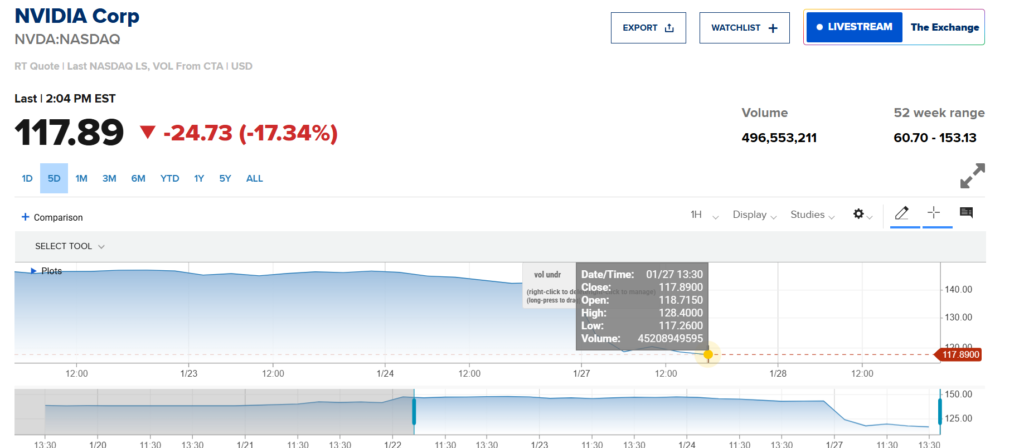
Shares of Nvidia, one of the most prominent beneficiaries of the AI boom, plummeted 15.8% on Monday, sparking a global sell-off in technology stocks. The drop marked Nvidia’s worst single-day performance since March 2020, as concerns grew over China-based startup DeepSeek’s rapid advancements in artificial intelligence and their potential to challenge America’s AI leadership.
Nvidia wasn’t alone in facing losses. Semiconductor giants Micron and Arm Holdings saw their shares tumble by over 10% and 9%, respectively. Broadcom fell more than 16%, and AMD slid 6%. The ripple effect also hit derivative energy firms tied to AI infrastructure, with Constellation Energy and Vistra losing 19% and 27%, respectively.
Global markets followed suit. European chipmakers like ASML and ASM International reported sharp declines, while Japanese semiconductor stocks such as Advantest and Tokyo Electron also saw steep losses.

DeepSeek: A Disruptor in the AI Arms Race
DeepSeek has rapidly emerged as a formidable player in the global AI market. In December, the company launched a free, open-source large language model, developed in just two months for under $6 million—a fraction of the cost incurred by U.S. tech giants like OpenAI and Google.
Last week, DeepSeek released a reasoning model that reportedly outperformed OpenAI’s latest in several third-party tests. These developments, combined with the company’s open-source approach, have positioned DeepSeek as a disruptor in the AI arms race, challenging the dominance of Western tech giants.
Marc Andreessen, co-founder of Andreessen Horowitz, described DeepSeek’s technology as “one of the most impressive breakthroughs I’ve ever seen” in a social media post. His praise added fuel to the growing concerns about the sustainability of U.S. tech firms’ heavy investments in AI.

The Role of GPUs and U.S. Hyperscalers
DeepSeek’s advancements have raised questions about the reliance of U.S. tech companies on costly infrastructure, particularly graphics processing units (GPUs), which are essential for training large AI models. Nvidia, the global leader in GPUs, faces increasing scrutiny as competitors like DeepSeek achieve similar results with fewer resources.
“DeepSeek’s success highlights the urgency for U.S. hyperscalers like Amazon and Microsoft to leverage their access to advanced GPUs,” said Srini Pajjuri, a semiconductor analyst at Raymond James.
However, analysts at Citi pointed out that access to cutting-edge GPUs remains a significant barrier for competitors outside the U.S. They noted that while DeepSeek’s achievements are impressive, the reliance on advanced chips like Nvidia’s ensures that leading AI companies are unlikely to move away from established GPU suppliers.

Skepticism Over DeepSeek’s Development Costs
DeepSeek claims its model was developed for less than $6 million, but some analysts remain skeptical. Bernstein analysts suggested that the reported cost likely excludes prior research expenses or other hidden investments that contributed to the model’s development.
While praising DeepSeek’s technology as “fantastic,” Bernstein analysts cautioned against labeling it as a “miracle breakthrough.” They argued that fears of an imminent collapse of the AI infrastructure market are exaggerated.
Still, the buzz surrounding DeepSeek has reignited debates about whether U.S. dominance in AI is sustainable. The $500 billion Stargate AI project announced last week underscores the growing need for advanced computing resources to maintain competitiveness in the sector.



Global Implications and Market Shifts
DeepSeek’s rise has forced the global AI community to confront the potential for disruption from leaner, faster-moving startups. With its open-source approach and low-cost development model, DeepSeek challenges the notion that astronomical budgets are required to lead in AI.
As fears of losing ground to China grow, U.S. tech companies and policymakers face mounting pressure to double down on innovation and address vulnerabilities in their AI supply chains.
For now, DeepSeek’s achievements are a wake-up call for the global tech sector, signaling that the next wave of AI innovation may come from unexpected players—and at a fraction of the cost.


























